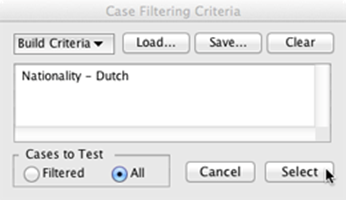
- #Share a study hyperresearch software#
- #Share a study hyperresearch free#
- #Share a study hyperresearch windows#
he2 Humongous Entertainment Game Archive. Is it possible that the filename extension is misspelled? hs2 file extension is often given incorrectly!Īccording to the searches on our site, these misspellings were the most common in the past year:
#Share a study hyperresearch windows#
Windows can go online to look it up automatically, or you can manually select one from a list of programs that are installed on your computer.
#Share a study hyperresearch free#
To open this file, Windows needs to know what program you want to use to open it. For example, in the teacher research study on interest children express in their free choice journal writing, the teacher researcher may share a list of all. When Windows does not recognize a filename extension, you receive the following message: If Windows recognizes the filename extension, it opens the file in the program that is associated with that filename extension. Overall: I have used HyperResearch since 2018 and have been pleased overall with its performance and versatility in projects ranging from handling field interview data, to coding PhD dissertations to show flow of ideas for clients, to using HyperResearch for policy analysis. When you double-click a file to open it, Windows examines the filename extension.

#Share a study hyperresearch software#
We briefly explore some of the initial approaches and opportunities this has created for opening up the black-box of research practices and shifting software training methods to engage learners in a process of discovery as “learning in the making” rather than being tasked with stepping through fixed frames of “ready made teaching”.Naturally, other applications may also use the. Their transformation and mediation to become “data” through different software packages are briefly explored.ĭrawing on Latour’s model of the two-faced Janus of science with which contrasts “science in the making" with “ready made science” we turn to consider ways in which this project can invert the usual trope of University education as research led, asking instead how a research project could become teaching-led. The initial stages of the research project are outlined including online participant recruitment via facebook, methods of screen-share remote interviewing to generate rich data exploring software use, and incorporating accounts of researchers’ practices. The pre-eminence and influence of expository writing and paucity of empirical research underscore the relevance and potential contribution of this project, We argue that part of that contribution comes from drawing on insights from science and technology studies (STS) which offer a well-developed vocabulary and set of approaches for exploring the agencies and mediation of technologies in the practices of research. We explore the positioning, continuities and disjunctures between manufacturers promoting their software, positioning in teaching and training materials and a range of views in the literature from critical to laudatory, as well as their prevalence in research on networked learning. Computer aided qualitative data analysis software (CAQDAS) packages such as ATLAS.ti, NVivo and HyperRESEARCH are the focus of competing claims and critiques. This work-in-progress paper explores the intersection of technologies and software with the practices, of qualitative research and qualitative data analysis. Steve Wright, Ibrar Bhatt, Lancaster University

Teaching-led research? Exploring the digital agencies of software in qualitative research Research Paper, Networked Learning Conference 2016 - NLC2016, Lancaster University UK


 0 kommentar(er)
0 kommentar(er)
